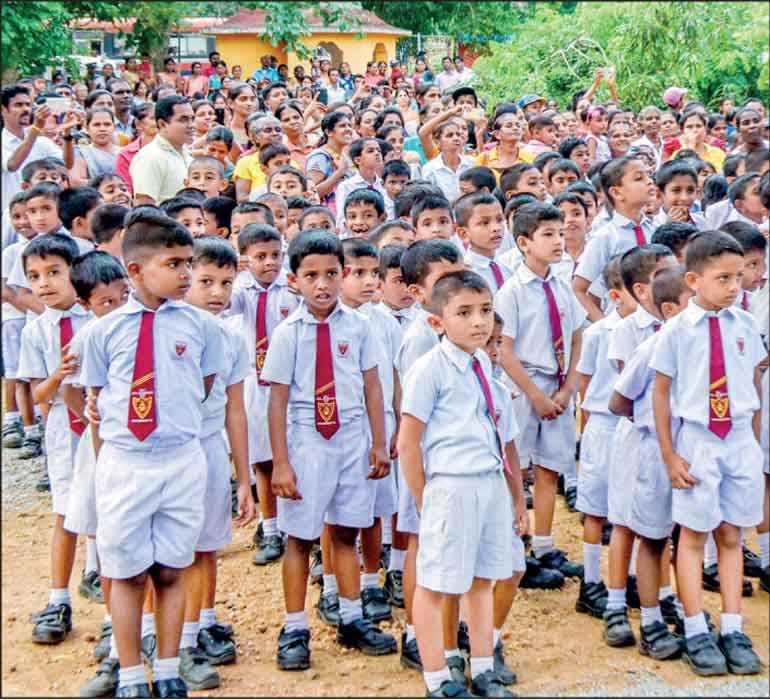Saturday Feb 21, 2026
Saturday Feb 21, 2026
Saturday, 21 November 2020 00:12 - - {{hitsCtrl.values.hits}}

In Sri Lanka, the Government provides free access to compulsory primary and secondary education, but not to preschool education which is not mandatory. 70.8% of preschools and 78% of day care centres are privately operated and entail levy fees, thus reducing access and affordability for a sizeable segment of the population. Enrolment rates in primary and secondary education are high at 99% and 84% respectively. These rates were 56.6% in 2016 for preschool children between 3-5 years of age.
Access to affordable childcare directly affects the country’s labour force. It is worth noting that despite the high educational attainment of Sri Lanka’s women, the country’s female labour force participation rate was just 34.5% in 2019. A 2018 study by the International Finance Corporation (IFC) found that having a child under five years of age reduced a Sri Lankan woman’s participation in the labour force by 7.4% as compared with a woman who did not have young children.
What’s more, as Sri Lanka’s population ages – it has the most rapidly aging population in South Asia – family structures and gender roles change. Reduced support from the extended family is likely to leave families less able to care for young children at home, increasing their demand for childcare.
The good news is that employer support for childcare is growing. However, it does not reach parents who work in the informal sector, which in 2019 accounted for 57.4% of all workers.
Early years services in Sri Lanka
Since 2000, successive governments have recognised the need to invest in early years services. The country has traditionally delivered these services through a multisectoral approach, with the involvement of several key ministries led, until August 2020, by the Ministry of Women and Child Affairs and Social Services (MWCASS). In addition, provincial authorities also have the power to pass legislation for the management and supervision of preschools in their provinces.
The involvement of multiple stakeholders and the lack of clarity in administrative structures has posed a major challenge for the ECCE sector. It has led to inadequate policy coherence, impacted resource allocation, and resulted in a duplication of functions. This has made it difficult to enforce uniform standards and regulations, particularly concerning the regulation of and coordination with the private sector.
In January 2020, the Sri Lankan cabinet approved a national Policy on Preschool Education tabled by the Ministry of Education (MoE). Following the parliamentary elections in August 2020 and the reorganisation of ministerial mandates, ECCE was brought under the purview of the MoE, and the MWCASS was named as the State Ministry of Women and Child Development, Preschool and Primary Education, School Infrastructure and Education Services (SMWCDPPESIES). Discussions surrounding the details of this reorganisation are currently underway.
These changes have the potential to significantly change the ECCE landscape in the country and can pave the way for the re-evaluation and reorganisation of early years services. Changes in the administrative structure call for significantly strengthened mechanisms to ensure coordinated and comprehensive service delivery for children and parents.
Across the world, countries have adopted varying levels of integration of childcare and education to suit their individual needs and contexts. Countries like Finland, for instance, combine the advantages of preschools and childcare centres by providing ECCCE services through integrated centres. Others, like Ireland, have chosen not to venture into integration, and continue to provide separate services while introducing mechanisms for better coordination and collaboration. Integration must necessarily be understood within the particular social context of individual countries, and a one-size-fits-all approach to integration is neither feasible nor advisable.
Since early 2016, the World Bank has provided significant support for the ECCE sector in Sri Lanka. The World Bank-funded Early Childhood Development (ECD) project, being implemented island-wide by the SMWCDPPESIES, aims to enhance equitable access to and improve the quality of ECCE services. It seeks to do this by facilitating teacher training, improving facilities, devising assessments for child development, creating a common registration framework for ECD centres, and introducing a management information system for ECCE services, among other activities.
The administrative reorganisation will provide Sri Lanka an ideal opportunity to assess the pros and cons of full or partial integration, and consider if and how aspects of integration can potentially help increase access to and quality of early years services in the country.
This is a decisive period for Sri Lanka’s ECCE sector. With a committed Government, and development support in place, the time is ripe for progress.
Highlights:
Across the globe, there has been a renewed commitment to expand early years’ services for children under five years of age. Early Childhood Care and Education (ECCE) includes both education and childcare, and while they have traditionally occupied distinctly different spheres, there has been a growing trend to integrate the two to provide more efficient and effective ECCE services for families.